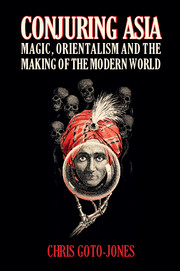Conclusion: magic in the world
Published online by Cambridge University Press: 05 July 2016
Summary
Looking back on this project, I find that I am relieved to see that it involved so few balloon animals or card tricks. Having said that, it's worth taking a moment to reflect on the absence of the latter: while they have become such a staple of modern and contemporary magic (including in Asia), playing cards have played almost no role in this story of Oriental magic. Indeed, this absence is one of the simplest historical observations about these categories. The absence of balloon animals seems less interesting, at least to me.
One of the ideas that I have tried to keep in focus throughout this book is that ‘modern magic’ can be a meaningful category, not only historically but also theoretically and performatively. When I say it's a meaningful category, I'm also saying that it's not a universal category – some magic isn't modern magic. Indeed, ‘modern magic’ can be seen as a critical category, both in terms of its engagement with ethics and aesthetics.
A powerful characteristic arises from the contradictory relationship between its two essential components: modernity and magic. While modernity appears to push in the direction of the scientific disenchantment of the world and the eradication of magic, modern magic seems to absorb this tendency and transform it into a form of creative tension. Within this tension seems to reside a basic human desire to live lives of enchantment – lives with non-material meanings. Modern magic embraces this desire while denying its object; it maintains that magic can be meaningfully experienced even within the parameters of a disenchanted modernity. This is an ethically delicate balance, and magicians have played with it in various ways, sometimes successfully, and only sometimes deliberately.
A curious outcome of this tension has been the modern magician's paradoxical fear of magic and the concomitant tendency towards self-ridicule. The modern magician embodies both the desire to bring magic into the world and a cultural nexus that declares this juvenile or primitive. During the so-called Golden Age of Magic, as part of the relegation of magic to the margins and peripheries of society, some magicians recognized the possibilities inherent in the geographical margins of empire – in the so-called Orient – as a potential space for squaring this circle.
- Type
- Chapter
- Information
- Conjuring AsiaMagic, Orientalism and the Making of the Modern World, pp. 304 - 309Publisher: Cambridge University PressPrint publication year: 2016



